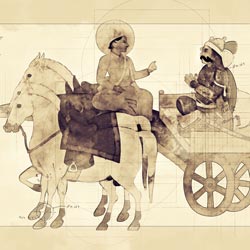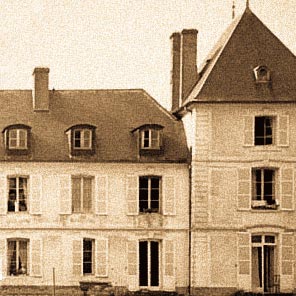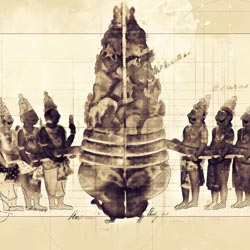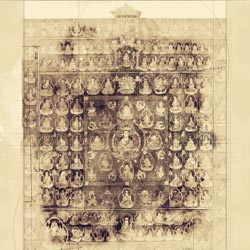
[OUSPENSKY] Gurdjieff gave the ideas little by little, as though defending or protecting them from us. When touching on new themes for the first time he gave only general principles, often holding back the most essential… The next time, in approaching the same subject, he gave more… But it is impossible to avoid repetition in certain cases and the original exposition of the ideas of the system in the way Gurdjieff gave them is, in my opinion, of great interest.
In Search of the Miraculous – The Choice of Book Title
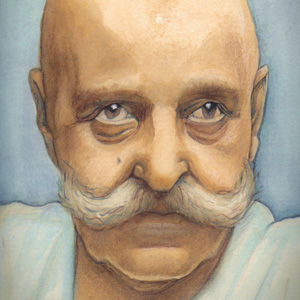
George Gurdjieff
In Search of the Miraculous is a book authored by Peter Ouspensky, widely regarded as the most comprehensive and systematic account of the teachings of George Gurdjieff. From 1915 till 1918, Ouspensky took notes of Gurdjieff’s lectures, and the oldest known draft of a book compiled from these notes dates to 1925. Ouspensky was never fully satisfied with the title In Search of the Miraculous. He had originally intended it to be published as Fragments of an Unknown Teaching (under which name it appears in most other languages). But since another book of a similar title had already appeared not long before, an alternate title had to be chosen. The final title was probably inspired by the book’s opening paragraph, where the author explains that “at the start of my journey I had said that I was going to “seek the miraculous”.”
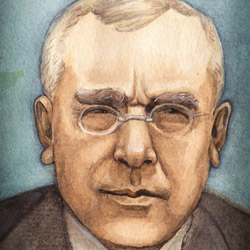
Peter Ouspensky
Ouspensky was very cautious about publishing in general. He was unsure whether the teachings presented in In Search of the Miraculous were better left hidden, protected from distortion, so that they couldn’t be subsequently quoted out of context. The book itself labors to present the teaching in the context in which it occurred: the Russian revolution and the beginning of World War I. The growing sociopolitical chaos of that time underscores many of the fundamental ideas Gurdjieff stresses, such as the complete mechanicality of humankind, their inability to do, and their slavery to planetary influences. Ouspensky left the decision of whether or not to publish In Search of the Miraculous in the hands of Gurdjieff himself, and after Ouspensky’s death, his wife delivered the manuscript to Gurdjieff, who apparently was positively impressed and approved its publication.

[JOHN G. BENNETT] “Ouspensky said that Gurdjieff’s power lay in the use of the spoken word. He called him the finest lecturer he had ever heard, able to convey to an audience, large or small, a sense of the reality and immediacy of the theme that he was exposing, in a way that even the most talented professional lecturer could not emulate. On the other hand, Ouspensky had a poor opinion of Gurdjieff’s writing and said that, when it came to the written word, he could express Gurdjieff’s ideas very much better than Gurdjieff could himself.”
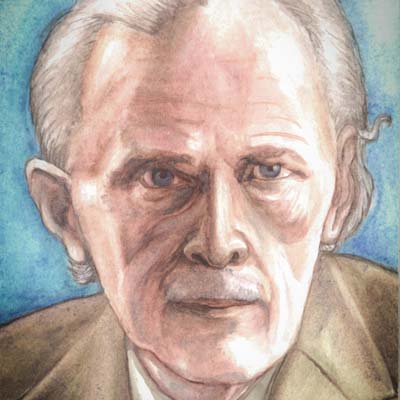
John G. Bennett


In Search of the Miraculous – The Setting
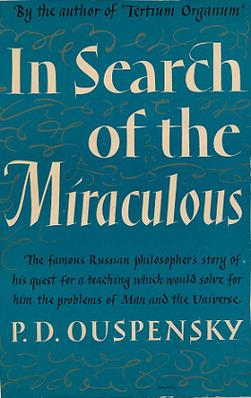
In Search of the Miraculous
“It seemed to me that the way to the unknown could be found in the East,” explains Ouspensky in the beginning of In Search of the Miraculous. Between 1913 to 1914 Ouspensky visits Egypt, Ceylon (present day Sri Lanka), and India. The onset of World War I forces him to return to Russia, where in the spring of 1915 he meets George Gurdjieff. He realizes that this man has the knowledge he had hoped to find in his journey to the east. At this stage, Gurdjieff lectures in cafes and seems to move between Moscow and St Petersburg. These are the primary locations in which In Search of the Miraculous is set, except toward its end, where deteriorating conditions in Russia force them (along with many others) to head eastward. At the conclusion of the book, Ouspensky settles in London, and Gurdjieff heads toward France.
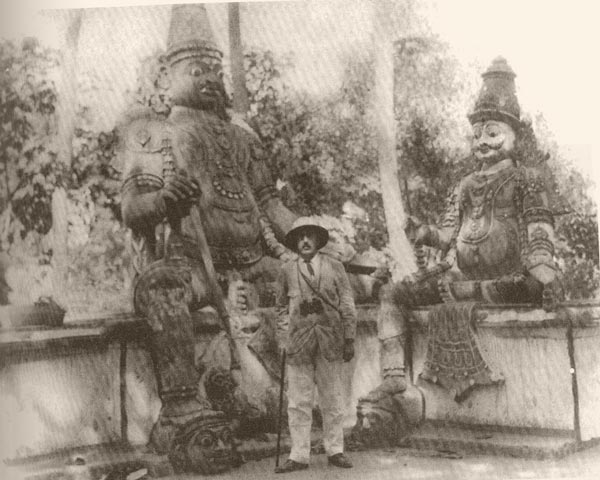
Ouspensky in Ceylon (Present day Sri Lanka)
A General Overview of the Contents
The many ideas covered in In Search of the Miraculous span philosophy, cosmology, psychology, mythology, symbolism, and religion. Gurdjieff often starts a lecture by drawing from an ancient source and gleaning from it psychological conclusions. These conclusions many either be on a practical level that instructs his students how to work on themselves, or on a theoretical level that enables them to form a more objective understanding of themselves and their place in the world. As Ouspensky becomes more and more familiar with Gurdjieff and his methods, it transpires that Gurdjieff had traveled extensively throughout the east and had spent much time gathering hidden knowledge, that presumably was more available a generation back that at the onset of World War I. In expounding these ancient ideas, Gurdjieff adds the missing link of their practical application. In the course of the book, Ouspensky realizes that this link is the effort of self-remembering, a deliberate effort on a person’s part to be conscious of himself. Gradually, all the other ideas of the system revolve around this central effort, as spokes around a wheel.
Therefore, the lectures shared in In Search of the Miraculous are inseparable to the students’ experience of practically applying them. Ouspensky periodically shares his own experiences, such as trying to remember himself walking along the Liteiny towards the Nevsky in St Petersburg. This comes to a climax in Chapter 17, where, in Essentuki (a city at the western extreme of Russia) he experiences a prolonged and unusual state of consciousness that changes his understanding of the whole teaching, of himself, and lays the ground for his eventual parting from Gurdjieff.


In Search of the Miraculous – The Ending

At this same gathering in Essentuki, Gurdjieff unfolds the plan of the whole work to a small group of hist students. He then announces his decision to disperse the entire group and stop working. Ouspensky’s confidence in Gurdjieff begins to waver from this moment onward. When Gurdjieff changes his mind again and regathers everyone a few months later, Ouspensky observes changes in the direction of Gurdjieff’s work, and realizes his own impossibility of continuing as Gurdjieff’s pupil.
“When I met Gurdjieff I began to work with him on the basis of certain principles which I could understand and accept,” explains Ouspensky in a much later meeting, in 1937. “Gurdjieff said: ‘First of all you must not believe anything, and second you must not do anything you don’t understand.’ I accepted him because of that. Then, after two or three years, I saw him going against these principles. He demanded from people to accept what they did not believe and to do what they did not understand. Why this happened, I don’t pretend to offer any theory.”
.
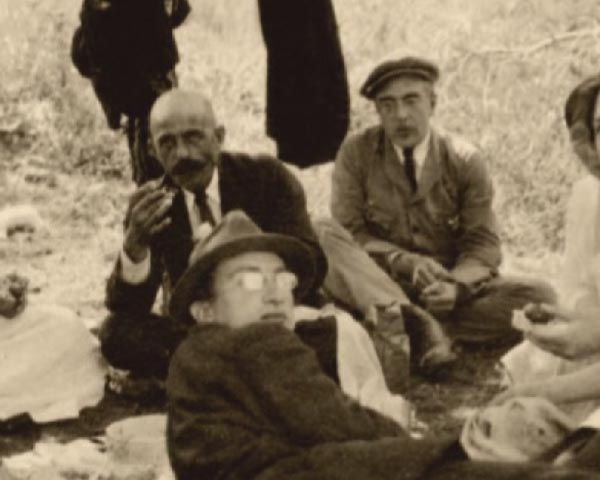
Gurdjieff and Ouspensky circa 1915
Other Fourth Way Authors on In Search of the Miraculous

[MAURICE NICOLL] “When Ouspensky was sent by Gurdjieff to England to start teaching he gave Ouspensky the task of putting Gurdjieff’s teaching in writing, and in the earlier chapters of the book In Search of the Miraculous, which belong to the earlier days of the Work in England, Ouspensky gave a very good portrayal of Gurdjieff and how he met him and what he was taught by him.”
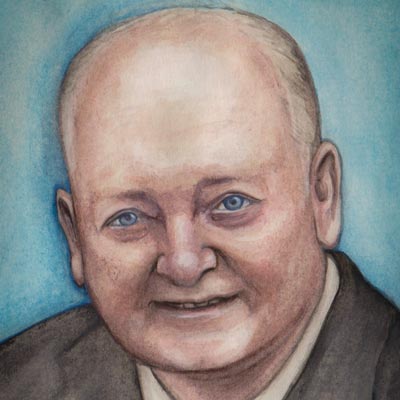
Maurice Nicoll
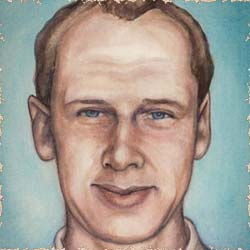
Rodney Collin
[RODNEY COLLIN] “According to my understanding, the ‘system’ that Ouspensky said he abandoned in the last stage of his life was the system developed in ‘In Search of the Miraculous’, or rather the language and manner of presentation, the exterior form of this system which had to be abandoned. The laws and principles that were indicated there cannot be abandoned, because they are laws of the universe itself.”


[JOHN G.BENNETT] “Fortunately, Ouspensky recorded and subsequently published the greater part of what Gurdjieff taught during the four years they were in contact. So far as I am concerned, this material, which Ouspensky used for his own teaching in the years from 1922 to 1940 when he had his groups in London, constitutes the most valuable corpus of ideas and methods that I have come across in fifty years of searching.”

John G. Bennett

Subscribe to our mailing list
Subscribe to our mailing list
In 2022/24, BePeriod will be creating a full-length documentary on George Gurdjieff
© BePeriod
